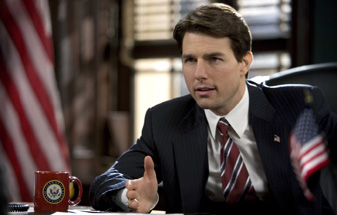Top 12 Film Industry Stories of 2007 #10:
Audiences Firmly Reject War-Related Movies
By David Mumpower
December 28, 2007
BoxOfficeProphets.com

Perhaps fooled by the relative success of Jarhead, a movie that owed its box office results to the catchy tune of Jesus Walks more than its own quality, several filmmakers decided that six years was long enough to wait after 9/11. With a couple of movies on that very topic finding success in 2006, the thought process would be that producers could educate as well as entertain. Consumers had their own thought process about the idea of being educated while entertained. It was something along the lines of, "Where do you get the nerve, you stupid jackass?" The message has been received loud and clear.
The writing was already on the wall at the start of the year. Home of the Brave, an Irwin Winkler production starring Samuel L. Jackson, had a forgettable two city awards run to qualify for the Academy Awards. The story predicated upon three soldiers from the Iraqi conflict struggling to come to terms with their return to a safer existence found no popularity anywhere. MGM quickly soured on the idea of marketing the title, eventually settling upon the decision to bury it in 44 theaters on opening weekend. Its total gross of $40,830 was not much of a return on the investment of approximately $12 million. This was the warning shot off the bow about how 2007 would treat its war-related releases.
The summer examination of terrorism was A Mighty Heart, the theatrical adaptation of the Mariane Pearl novel of the same name about the kidnapping of her husband, Daniel Pearl. The dreary story of this one involves a reporter kidnapped in Pakistan and later put to death by his captors. Like Home of the Brave, A Mighty Heart could claim an A-List actor heading up the production. But the presence of Angelina Jolie did little to aid the title at the box office. It earned only $9.2 million in domestic receipts against a budget of $16 million. With $28 million invested in 2007 movies about the war and terrorism, Hollywood had only $9.24 million to show for its effort, but the two biggest titles were yet to get their trial runs.
The Kingdom, an $80 million production starring Jamie Foxx, and Lions for Lambs, a $35 million production starring Tom Cruise and Meryl Streep, had something odd in common. Both were written by Matthew Carnahan, brother of avant-garde Narc director Joe Carnahan. The scribe Carnahan wrote the two screenplays as spiritual brethren, one being the corollary to the other. The Kingdom was the physical application of American political policies in the Middle East as well as the impact they might have on our citizens while Lions for Lambs was the theoretical application wherein battles took place in newsrooms and offices as well as on foreign soil.
The Kingdom was intended to be the more commercial piece while Lions for Lambs was positioned as an awards season contender. Neither one happened. The Kingdom earned $47.5 million, a substantial loss against its $80 million budget. Lions for Lambs suffered a worse fate, finding itself all but laughed out of theaters. A paltry $14.8 million worth of sales occurred, a significant loss against the $35 million budget. The movie's biggest problem is that it was pre-judged. In fact, hundreds of reviews popped up online. They had been written by people who openly confessed they had not watched Lions for Lambs. Instead, they simply formed an opinion based upon the trailers and various descriptions of the film. Consumers took a stand against what they perceived to be the idea behind the story. In this regard, at least, one of Carnahan's titles triggered an emotional response, albeit not the one anticipated. Potential movie-goers not only refused to watch another gloomy entry into the War on Terrorism genre. They went out of their way to discredit it prior to release.
These are not the only war-related failures of the year, either. In the Valley of Elah, a movie frontlined by Tommy Lee Jones and Charlize Theron, managed only $6.8 million. Redacted is a Brian De Palma film that is eerily similar in nature to his prior based-on-real-events war story, Casualties of War. It earned less than $63,000 against a $5 million budget. And while The Kite Runner still has a chance to exceed its budget of $20 million, early results are lackluster at best. The title has current domestic revenue of less than $3 million.
There is one final production that had hope of turning around the success rate of war/terrorism-related movies in 2007. That title, Charlie Wilson's War, has the star power of Tom Hanks and Julia Roberts as its main catalyst, but it also has the benefit of exemplary reviews. Its positives have not translated into solid box office thus far, however. It has a total of less than $25 million after a week in theaters. Given a reported production budget of $75 million, this is certainly not the performance Universal Pictures expected of such a pedigreed title.
Look at the list above and keep in mind that most of the titles listed had good if not excellent reviews as well as word-of-mouth. Now consider that titles such as Norbit, Wild Hogs, and Alvin and the Chipmunks are among the biggest hits of 2007. Consumers have voted with their wallets, telling Hollywood that they are much more interested in gladiators, zombie-fighting scientists, flaming-skulled bikers and pregnant teens than they are in war-related movies. If you still are not convinced, simply consider this. Balls of Fury, a *ping pong* movie starring something called Dan Fogler, earned $32.8 million. Only one of the titles mentioned above can claim bigger box office. As it stands, Charlie Wilson's War is the perfect summation of 2007 on the whole. No matter the cast involved, war related movies were proven unwelcome in 2007.